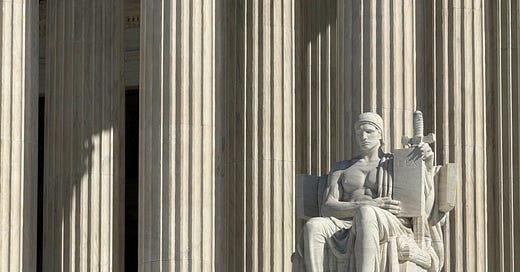6 - 3 VICTORY Mahmoud v. Taylor Parental Rights Upheld
Applying strict scrutiny, the Court found that the Board failed to demonstrate that its no-opt-out policy was narrowly tailored to a compelling interest.
In Mahmoud v. Taylor, decided on June 27, 2025, the U.S. Supreme Court addressed a challenge by parents against the Montgomery County Board of Education’s implementation of “LGBTQ+-inclusive” storybooks in public school curricula and its subsequent decision to eliminate opt-out provisions. The case, originating from the Fourth Circuit, centered on whether the Board’s policy infringed on parents’ First Amendment right to the free exercise of religion by compelling their children’s exposure to materials conflicting with their religious beliefs.
The parents argued that the Board’s policy, which introduced storybooks promoting normative views on same-sex marriage and gender identity for students from pre-K (as young as three or four) through sixth grade, substantially burdened their right to direct their children’s religious upbringing, as protected under Wisconsin v. Yoder (1972). They contended that the books’ messages—celebrating same-sex relationships and suggesting that gender is separable from biological sex—contradicted their sincerely held religious convictions and exerted pressure on their young, impressionable children to conform to opposing values. Citing Yoder, they asserted that the policy posed a “very real threat” to their ability to instill their beliefs, particularly after the Board rescinded opt-outs, leaving no means to excuse their children from the instruction.
During oral arguments, Justice Samuel Alito focused on the young ages of the children involved, noting that the books were approved for students as young as four and up to eleven. He questioned whether children of such ages could critically distinguish between their teacher’s moral assertions and their parents’ beliefs, suggesting that younger students are particularly vulnerable to accepting the books’ normative messages without question. Alito also highlighted the inconsistency in Montgomery County’s policies, pointing out that Maryland law allows opt-outs for health classes discussing sex and gender, yet the Board mandated participation in storybook sessions covering similar themes. These concerns underscored the parents’ argument that the books were age-inappropriate and dismissive of religious perspectives, a point reinforced by the Board’s own withdrawal of two books due to content concerns raised by parents and school principals.
The Board countered that the curriculum merely exposed students to diverse ideas and promoted mutual respect, not coercion. It argued that its interest in maintaining an undisrupted, inclusive learning environment justified the no-opt-out policy, relying on cases like Bowen v. Roy (1986) and Lyng v. Northwest Indian Cemetery Protective Assn. (1988) to assert that the government is not obligated to accommodate individual religious beliefs. The Fourth Circuit had upheld the Board’s position, deeming the parents’ claims insufficiently substantiated and Yoder inapplicable.
The Supreme Court, in a majority opinion by Justice Alito, joined by Chief Justice John Roberts and Justices Clarence Thomas, Neil Gorsuch, Brett Kavanaugh, and Amy Coney Barrett, reversed the Fourth Circuit, granting a preliminary injunction to the parents. The Court held that the parents were likely to succeed on their free exercise claim, as the Board’s policy imposed a substantial burden akin to that in Yoder. The storybooks’ normative messages, combined with the lack of opt-outs, interfered with the religious development of the parents’ children by presenting values hostile to their beliefs. The Court rejected the Board’s characterization of the instruction as mere exposure, emphasizing that the books’ prescriptive nature and the Board’s encouragement of teacher reinforcement crossed the threshold of unconstitutional interference. Justice Thomas filed a concurring opinion, reinforcing the majority’s reasoning.
Applying strict scrutiny, the Court found that the Board failed to demonstrate that its no-opt-out policy was narrowly tailored to a compelling interest. While acknowledging the Board’s interest in an undisrupted learning environment, the Court noted that the Board’s allowance of opt-outs in other contexts, such as health classes, undermined its claim of necessity. The Court also dismissed arguments that parents could opt for private schooling or home education, citing Trinity Lutheran Church v. Comer (2017) to affirm that public education, as a public benefit, cannot be conditioned on sacrificing religious exercise, especially given Maryland’s compulsory education laws.
Justice Sonia Sotomayor, joined by Justices Elena Kagan and Ketanji Brown Jackson, dissented, arguing against the majority’s application of Yoder and its conclusion that the Board’s policy unconstitutionally burdened religious exercise.
In summary, the Court’s decision, informed by concerns about the vulnerability of young children and inconsistencies in opt-out policies, reaffirmed the robust protection of parents’ rights to direct their children’s religious upbringing. By ordering the Board to reinstate notice and opt-out provisions pending further review, the ruling underscores the judiciary’s role in safeguarding religious liberty against policies that substantially burden free exercise, particularly in public education settings involving young students.




